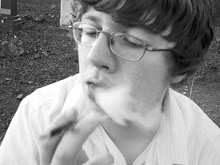So, deep down I'm a music major. I admit it. And today I was listening to some old choral music that, at one time, I obsessed over. My favorite new choral composer is probably Eric Whitacre, but I realized today that the prize for all-around favorite new kid on the block goes to another: Frank Ticheli. He is a prolific composer of wind ensemble music, notably the innovative settings of the old folk song "Shenendoah" and the timeless hymn "Amazing Grace." (On a sidenote, I've played both of those, and he writes beautiful alto saxophone solos...maybe I'm prejudiced.) Last March, I went to see the University of Oregon wind ensemble perform, and they played a piece of Ticheli's called "Sanctuary." Now, my other home boy, Eric Whitacre, composes for wind ensemble as well, but his pieces just aren't as good. He held the crown of best until I gave a listen to an oldie, but a goodie. But first, the back-story:
Last fall, after being in choir for all of two weeks, Mrs. Antonsen dragged me off to Willamette University for a men's choir festival. They gave us free CDs, and one of them was their Chamber Choir's best recording. It was a great album, containing works by my three favorite postmodern composers: Moses Hogan (he only does gospel, so he's not anywhere near the other two...but he DOES gospel), Eric Whitacre, and Frank Ticheli. Whitacre's "Cloudburst" really caught my attention, with its innovative techniques and radical chord changes. In fact, it overshadowed the quiet brilliance of Ticheli's piece, "There Will Be Rest." Don't misunderstand me. They are both amazing songs that bring me to tears regularly, but the message and the setting of Ticheli's (dare I say it) outstrip Whitacre's.
See, the problem is textual SETTING. Whitacre's music is beautiful, and he does such marvellous things with words, for example: in his setting of e.e. cummings's "i thank you God for most this amazing day" he makes the indefineable words "you" and "God" shimmer, at one point (for you music aficionados) having the first parts sing a Dm7 and the seconds sing an Em7, resulting in an entire octave. Every natural note. From D to D. Ballsy, and beautiful. However, most of Whitacre's songs are beautiful aurally, but convey no message. Ticheli, however... first, I'll show you the poem. It's by Sara Teasdale, with the same name as the piece.
There Will Be Rest
by Sara Teasdale
There will be rest, and sure stars shining
Over the roof-tops crowned with snow,
A reign of rest, serene forgetting,
The music of stillness holy and low.
I will make this world of my devising,
Out of a dream in my lonely mind,
I shall find the crystal of peace, -- above me
Stars I shall find.
A word about the author: Sara Teasdale suffered from severe clinical depression, and she ended up taking her own life. In fact, this is her last published poem.
Taking that into account, Ticheli's setting is all the more poignant. The quiet assertion of the title statement, the descent to the word "low" at the end of the first stanza...supurb. Then, at the final repetition of that line, the piece totally turns for a moment, declaring, announcing, the author's dominion over her surroundings. And then, suddenly, the cascading sound drops to nothing as "in my lonely mind" is nearly whispered. Perhaps my favorite moment in the piece is the last. It is first a prayer, and then, at the resolution, in a strong major chord, a promise, a vow, made especially moving at the thought that the author of the text did indeed make the world of her devising, and she did find her stars, when she ended her life.
Sorry about the esotericism. I couldn't help it. I haven't analyzed music for so long.
And again: Moses Hogan, Eric Whitacre, and Frank Ticheli. All worth many a listen.
Tuesday, October 9, 2007
A Rediscovery of Something Beautiful
Subscribe to:
Post Comments (Atom)

1 comment:
I beg to differ. Eric Whitacre is a God. I think you left out "When David Heard" and duhh " Cloudburst" I like Frank Tichelli, but Whitacre is far far better. Oh and...Moses Hogan is a God too.
Post a Comment